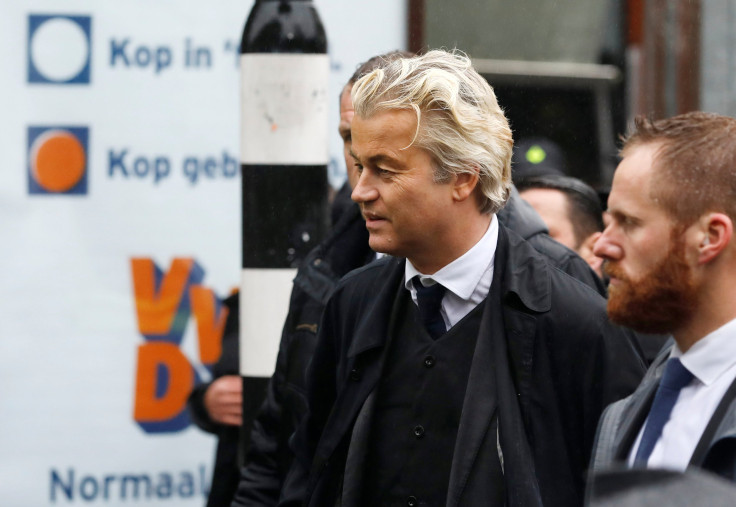Dutch Election Polls Show Anti-Islam Candidate Geert Wilders Still In Contention

The party of anti-Islam candidate Geert Wilders is one of five parties right in contention for first place a week before the Dutch election, latest polls have shown. But in an election that many see as a setting the tone for future votes this year in France and Germany, Wilders’ Party for Freedom (PVV) appeared to be losing ground in the final stretch of the campaign.
A poll from I&O Research released Tuesday put Wilders’ party four seats back, 24-20, from current Prime Minister Mark Rutte’s Liberals. Although polls from I&O Research have consistently shown PVV with lower numbers than other polling companies, another poll, from Peil.nl, also showed Wilders’ party having fallen behind, although only by two seats.
Across the board, the race appeared to be tightening up. The Christian Democrats, Alexander Pechtold’s Democrats and the Greens had also gained ground in recent days to leave the vote still very much up in the air going into the final days.
Wilders has been called the “Dutch Trump” due to his populist appeal and anti-immigration rhetoric. Many have looked to the Netherlands for signs of whether the anti-establishment wave that led Trump and the Brexit campaign in the United Kingdom to victory will continue into 2017. But Rutte insisted that the Netherlands is poised to stop the movement in its tracks.
“What I sense is that people are coming back to my party,” he told Bloomberg TV Saturday. “Of course we are in government, we have to take tough measures. People have not always been happy with everything we did. But at the moment in the Netherlands we are experiencing a revival of our economy, our housing market, people are finding jobs again. This is all good news.”
Even if Wilders’ party got the most seats, there was far from a guarantee that he would end up as prime minister. All but one of the other parties have ruled out forming what would be a necessary coalition with Wilders, who was convicted of inciting discrimination last December over an anti-Moroccan chant.
That realization may also count against Wilders in the vote, one expert has suggested.
“Some potential PVV voters might feel that their vote is lost as the main parties excluded to cooperate with Wilders,” Holger Sandte, chief European analyst at financial services group Nordea, told CNBC.
© Copyright IBTimes 2024. All rights reserved.





















